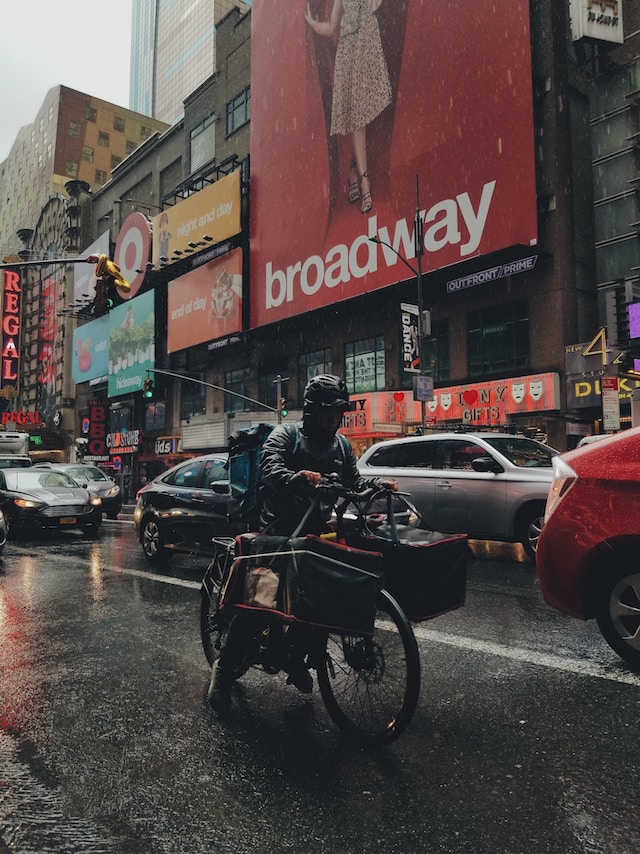Summary | Excerpt | Reviews | Beyond the Book | Read-Alikes | Genres & Themes | Author Bio

Stories
by Jamel BrinkleyThis article relates to Witness
 One story in Jamel Brinkley's collection Witness is about a woman who keeps receiving friendly notes from the same food delivery person and drafts long, personal letters in reply. In her letters, Gloria, a room service server at a hotel, reflects that food delivery apps are responsible for eliminating jobs like hers, but expresses solidarity with and sympathy for her courier: "As if we didn't know how inadequately your people get paid. As if we couldn't imagine how your people must hope and pray never to fall seriously ill."
One story in Jamel Brinkley's collection Witness is about a woman who keeps receiving friendly notes from the same food delivery person and drafts long, personal letters in reply. In her letters, Gloria, a room service server at a hotel, reflects that food delivery apps are responsible for eliminating jobs like hers, but expresses solidarity with and sympathy for her courier: "As if we didn't know how inadequately your people get paid. As if we couldn't imagine how your people must hope and pray never to fall seriously ill."
The situation of food delivery workers on internet platforms is one of "systematic exploitation and dismal working conditions," according to a 2022 study of couriers in India published in the National Library of Medicine. This assessment is echoed throughout investigations of food delivery apps around the world.
While some take on delivery app work to supplement their earnings, for many it is their main source of income. The New York Times reports that often the people who perform these jobs, such as undocumented immigrants, are financially desperate. While they may consider themselves employees of the app or apps they work through, this is usually not technically the case. In most places, couriers for companies like Grubhub, DoorDash, and Uber Eats are not legally considered full employees but rather independent workers, freelancers, etc. Companies emphasize the positive aspects of gig work, like "autonomy" and "flexibility," but the negatives are substantial.
Food delivery apps maximize profits by labeling their couriers freelancers because it means they don't have to provide health insurance, retirement benefits, workers' compensation, minimum wage, overtime pay, and so on. Workers knowingly risk serious and even fatal traffic accidents, assault, and sexual harassment without hope of recompense. The Covid pandemic dramatically increased the demand for food delivery workers in its initial stages and has added illness to the list of the potential threats they face. Racing to make deliveries on time in dangerous conditions without any financial guarantees from one's employers is obviously very stressful. A 2023 study of delivery platforms in Finland reports that this work environment is "psychologically burdening" and "posed detrimental challenges to the mental wellbeing of its couriers."
Unsurprisingly, delivery app companies tend to be secretive about their operations and keep their workers at a distance. A participant in the Indian study said, "Everything happens through the mobile app. We do not know how it works." These disturbing words are matter-of-fact, as if spoken by a character in a dystopian novel, but they're indicative of a real shift towards alienating digital workspaces that make it easy to conceal exploitative practices, such as withholding tips. Brinkley has his finger on the pulse of these conditions when he has Gloria observe, "Sometimes I feel like I don't really know how the world works anymore. There are too many wires strewn about, it seems, and every one of them is invisible."
How can delivery apps be allowed to carry on these unscrupulous practices? Moe Tkacik, a senior fellow at the American Economic Liberties Project, an antitrust think tank, and founder of the Protect Our Restaurants campaign, calls the companies, in no uncertain terms, "bloodsucking middlemen" between restaurants and customers. She attributes their rise in part to a period of defunded and ineffectual antitrust reinforcement during the Obama administration. Silicon Valley companies with venture-capital funds essentially colluded to ensure that high fees for customers and poor compensation for workers became the norm across platforms.
Several actions have been proposed that would improve the conditions and wages of delivery workers, including classifying them as employees, holding companies accountable for injuries, assaults, and deaths, and making company data transparent. Workers are forming collectives, grassroots unions, and official unions to increase their bargaining power. This has already proven to be a viable solution in some places. In New York City, thousands marched through Times Square in April 2021 under the banner Los Deliveristas Unidos, which resulted in workers in the area winning "upfront information on routes, pay, and tips for each delivery, among other new protections." In the meantime, consumers can choose to order from delivery services that pay fairly and look after the well-being of their workers.
Photo of bicycle courier in New York City, by Clay Banks via Unsplash
Filed under Society and Politics
![]() This "beyond the book article" relates to Witness. It originally ran in August 2023 and has been updated for the
July 2024 paperback edition.
Go to magazine.
This "beyond the book article" relates to Witness. It originally ran in August 2023 and has been updated for the
July 2024 paperback edition.
Go to magazine.
Your guide toexceptional books
BookBrowse seeks out and recommends the best in contemporary fiction and nonfiction—books that not only engage and entertain but also deepen our understanding of ourselves and the world around us.